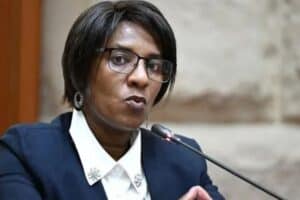On 3 December last year, the National Assembly adopted rules for the removal of Chapter 9 heads, like the Public Protector.

After a judge said it is in the interest of the public that Public Protector Busisiwe Mkhwebane be held accountable, her legal counsel, advocate Dali Mpofu, argued it is not if the process is an unconstitutional sham.
Wednesday’s hearing in the Western Cape High Court of Mkhwebane ‘s application to interdict Parliament’s process to remove or impeach her started at 10:00.
At around 16:30, about 30 minutes after high courts usually call it a day, Mpofu was still going strong.
ALSO READ: Public Protector’s removal a DA ‘vendetta’ – Dali Mpofu
Judge Vincent Saldanha said he had up until that point not said anything about the “various serious court findings” against Mkhwebane.
“So, there are many issues around the so-called serious charges, and all those charges are based on what is in court cases,” said Mpofu.
The Public Protector cannot be charged on court rulings against her – it would be double jeopardy.
He added there were punitive costs orders against her. “You can’t be punished twice for the same thing.”
“What we do have, is very serious findings by the Constitutional Court in respect of the conduct of your client in her office of the Public Protector,” said Saldanha.
He added it was surely in the interest of the public to proceed with disciplinary proceedings given the serious findings.
“There is no public interest, no public interest – zero – in having a process that is unconstitutional,” Mpofu retorted.
“That’s why we have a Constitution, otherwise we could just take her to the guillotine,” he added.
Saldanha said he was not going to allow Mpofu to compare public interest to the guillotine.
“We can’t simply dismiss this as sending her off to the guillotine,” he added.
Mpofu said he agreed, but added: “The public has no interest in a sham process that is not in line with section 194.”
Section 194 of the Constitution gives Parliament the authority to remove the Public Protector.
The guillotine remark was not the first time Saldanha took exception to something Mpofu said.
He chided him for comparing the rules for the removal of Chapter 9 heads to the Sobukwe clause – a clause passed by the apartheid legislature to arbitrarily extend Robert Sobukwe’s imprisonment.
“How can you make an analogy that this government made rules like the apartheid government did?” Saldanha asked.
Mpofu said he was not making that analogy.
Saldanha also seemed less than pleased when after belabouring a point for about 25 minutes, Mpofu conceded it was academic.
The court battle began in February after Mkhwebane filed an urgent bid in the Western Cape High Court seeking an interdict to halt the parliamentary process to remove her from office, which was kick-started by National Assembly Speaker Thandi Modise’s approval of a motion to that effect by the DA.
The interdict was only the first part of the application, Part A.
Mkhwebane is also asking the court to set aside the rules for the removal of Chapter 9 institution heads, such as the Public Protector, which the National Assembly adopted in December, and rule it unconstitutional and invalid, which is Part B.
The court only dealt with Part A on Wednesday.
On 3 December last year, the National Assembly adopted rules for the removal of Chapter 9 heads, like the Public Protector. Three days later, the DA brought the first motion for Mkhwebane’s removal.
Mpofu’s application was built on the argument there was a prima facie case the rules were unconstitutional.
Earlier in the day, he said the DA had a “vendetta” against Mkhwebane since day one, and Modise’s “attitude leaves much to be desired”
Modise’s counsel, President Cyril Ramaphosa and the DA will offer their arguments on Thursday.
Judges Elize Meyer and Monde Samela are presiding with Saldanha.
Mkhwebane’s case against her removal proceedings:
Some of the arguments Public Protector Busisiwe Mkwhebane’s legal representative Dali Mpofu raised against the removal proceedings are as follow:
The process isn’t fair, because Mkwhebane wasn’t informed of Speaker of the National Assembly’s decision, furnished with the reasons for the decision or allowed to respond.It is unlawful that the rules don’t allow Mkwhebane legal representation during the removal proceedings.
A person can’t be charged in terms of a rule based on something that happened before that rule was made.
The rules allowing Speaker of the National Assembly Thandi Modise to appoint a judge to the panel that should determine whether there is a prima facie case for the Chapter 9 head’s removal impinges on the doctrine of the separation of powers.
For more news your way, download The Citizen’s app for iOS and Android.






